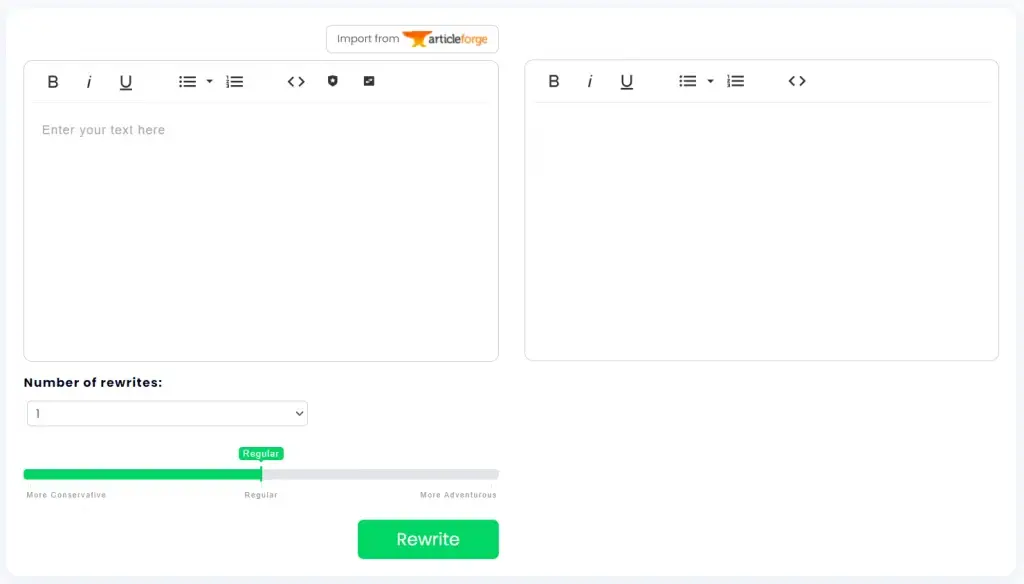
Can WordAI enable high-quality content creation? Our WordAI review analyzes its AI features to empower your writing.
In academic writing, you often need to rephrase content to ensure originality and prevent plagiarism. This can be a unique challenge.
WordAI presents a potential solution for you. It utilizes advanced language processing to assist you in your academic writing endeavors.
This review aims to explore the capabilities of WordAI, evaluating its relevance and effectiveness for you in academic settings. We examines this tool’s features, precision, and overall applicability.
Table of Contents
What is WordAI?
WordAI is an advanced tool that uses artificial intelligence to understand and rewrite text. It’s designed to create human readable content by rephrasing sentences and changing words while maintaining the original meaning.
Essentially, it helps generate unique versions of existing text, which can be useful for various purposes like content creation, SEO, or avoiding duplicate content issues.
What are the features of WordAI?
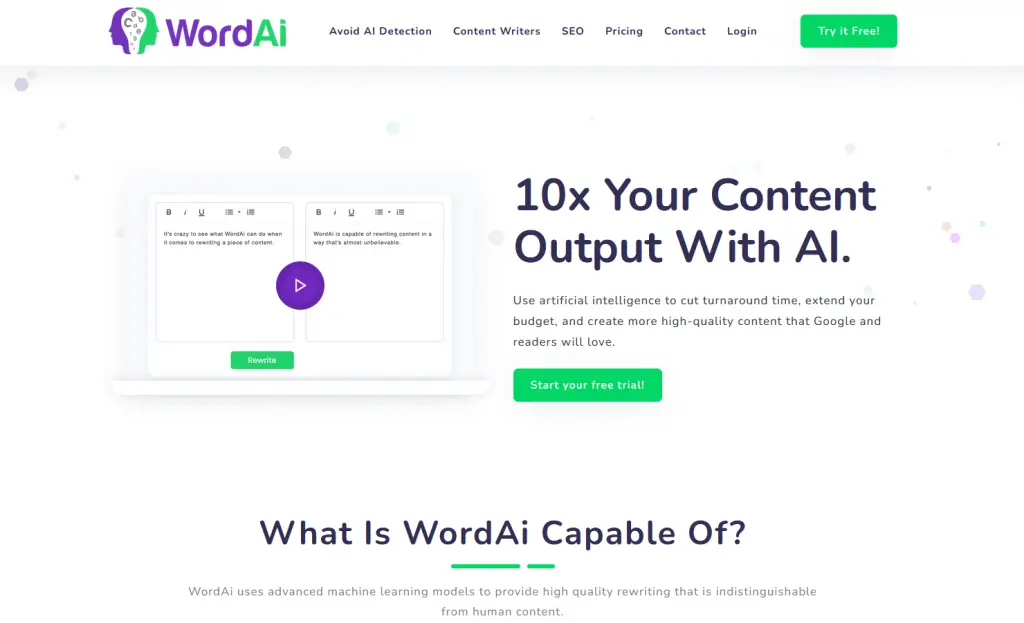
WordAI’s lineup of features acts like a team of trusty assistants, each playing a crucial role in polishing and refining your academic writing.
Whether it’s jazzing up your sentences, guarding against grammar gremlins, or dressing your writing in the right style, WordAI has your back, making sure your academic work stands out in all the right ways
Sentence Rephraser
Think of the Sentence Rephraser as your trusted “rewriting content.” It’s like having a virtual brainstorming buddy who helps you express ideas in fresh, original ways.
In academics, this tool becomes your go-to for rephrasing sentences while preserving the original meaning. Perfect for sidestepping plagiarism and adding that touch of creativity to your academic work.
Grammar Check
The Grammar Check feature is your grammar-savvy friend who double-checks your writing. It’s akin to having a grammar guru by your side, tirelessly scanning your text to ensure it’s free from grammatical hiccups and inconsistencies.
This is particularly important in academic circles, where impeccable grammar is akin to a badge of credibility.
Autocorrect
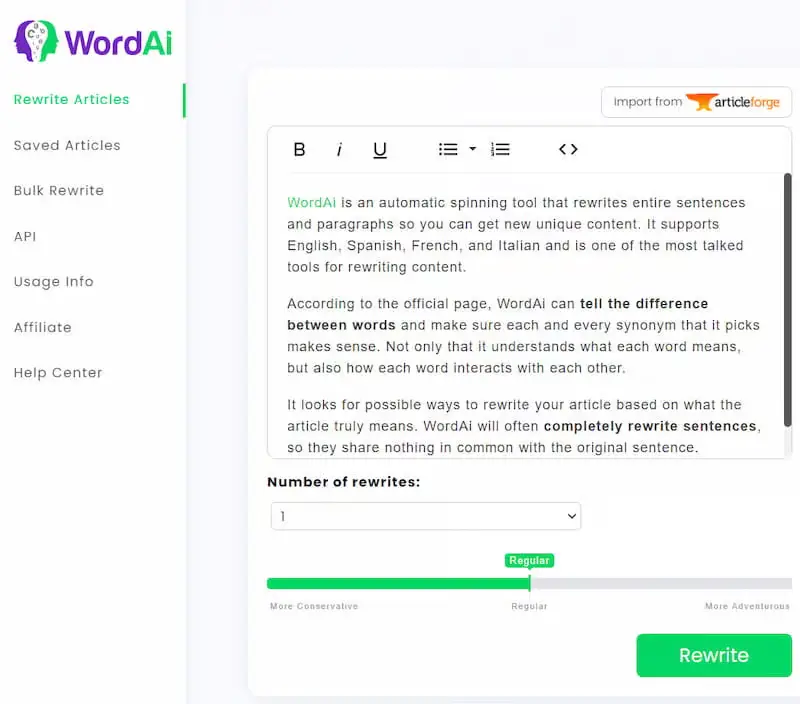
Autocorrect is your trusty spelling police. Picture it as the invisible guardian, swooping in to save the day whenever typos or spelling missteps threaten your document’s elegance. It’s a time-saver, swiftly rectifying slip-ups and allowing you to focus on your academic masterpiece without worrying about minor spelling and grammar mistakes.
Style Editor
The Style Editor is like your personal stylist for words. It helps you tailor your writing style to match the academic fashion of your choice—be it APA, MLA, or another style guide. This ensures your work looks sharp and consistent, leaving a lasting impression on your readers and examiners.
Sentence Formatting
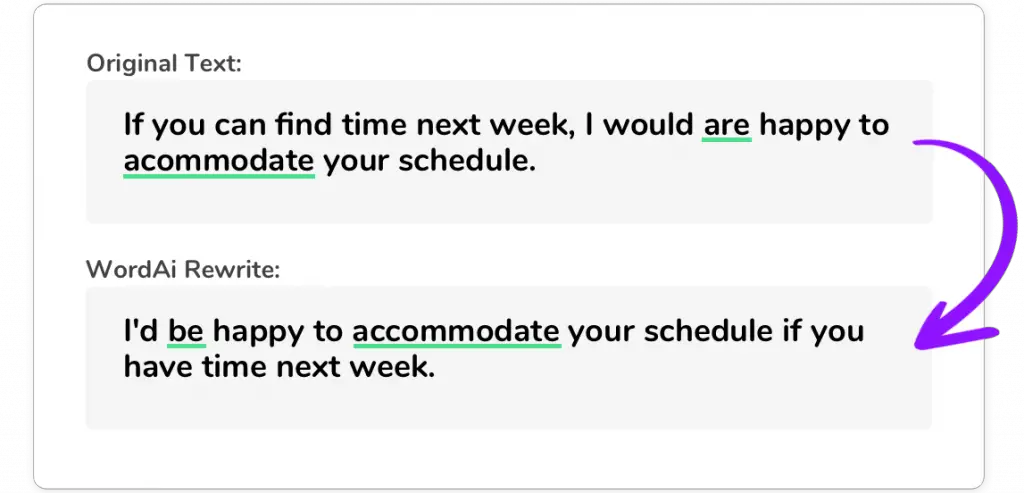
Sentence Formatting is like giving your writing a good structure and neat layout. It’s akin to organizing a presentation, making sure your ideas are showcased effectively. Proper sentence formatting ensures your academic work is a smooth, engaging read, allowing your ideas to shine through with clarity and precision.
How can you use WordAI in academics?

#1. Idea Expansion and Brainstorming
WordAI can assist you in expanding and brainstorming ideas by providing different perspectives or variations of a topic or concept. This tool can be particularly helpful during the initial stages of your research or essay writing, helping you explore diverse angles and possibilities.
#2. Language Improvement and Diversification
Utilizing WordAI, you can diversify and enhance the language used in your academic writing. It can help you generate a more engaging and varied vocabulary without deviating from the original meaning or intent, ultimately enhancing the overall quality of your work.
#3. Draft Enhancement and Synthesis
After creating an initial draft, WordAI can assist you in refining and synthesizing the content to improve clarity, coherence, and overall quality. By using this tool effectively, you can achieve a polished final piece that effectively communicates your ideas.
#4. Paraphrasing for Clarity and Understanding
WordAI can be used by you to paraphrase complex sentences or passages, aiding in comprehension and making academic materials more accessible to a broader audience. This can be particularly useful when explaining intricate concepts or theories in your writing.
#5. Language Translation and Comparative Analysis
Utilizing WordAI, you can facilitate the translation of your academic works into different languages, enabling comparative analysis and fostering a global perspective on your research and scholarly discussions. This can broaden the reach and impact of your work beyond language barriers.
What are the pros and cons of using WordAI in academics?

WordAI is an AI-powered content creation and rewriting tool that utilizes natural language processing and machine learning techniques. While it can be useful in certain contexts, it’s important to note that WordAI and similar tools are primarily designed for content creation, paraphrasing, and text generation, rather than for academic use.
Academic work usually requires a higher level of precision, understanding, and originality that these tools may not always provide.
Pros
#1. Efficiency and Speed
WordAI can expedite content creation and rewriting, saving time and effort, especially for handling large amounts of text.
#2. Paraphrasing and Plagiarism Prevention
WordAI helps in rephrasing text to reduce unintentional plagiarism by providing alternative wording while retaining the original meaning.
#3. Diverse Vocabulary and Sentence Structure
The tool introduces a variety of vocabulary and sentence structures, enhancing the quality and engagement of the academic content.
#4. Content Expansion
WordAI aids in expanding ideas and concepts by generating additional content, assisting in elaborating on a topic or overcoming writer’s block.
Cons
#1. Lack of Contextual Understanding
WordAI may lack a complete understanding of the context or nuances of academic topics, potentially leading to inaccuracies or irrelevant content.
#2. Inaccuracy and Inconsistency
Generated content may not always accurately convey the intended meaning, resulting in inconsistent or incoherent sentences.
#3. Originality and Academic Integrity
Academic work requires original thought and understanding, aspects that WordAI may not fully provide, risking a compromise in academic integrity and originality.
#4. Limited Control and Quality Assurance
Users have limited control over the output, and the quality of generated content can vary, necessitating careful review and manual editing.
What is the pricing and availability of WordAI?
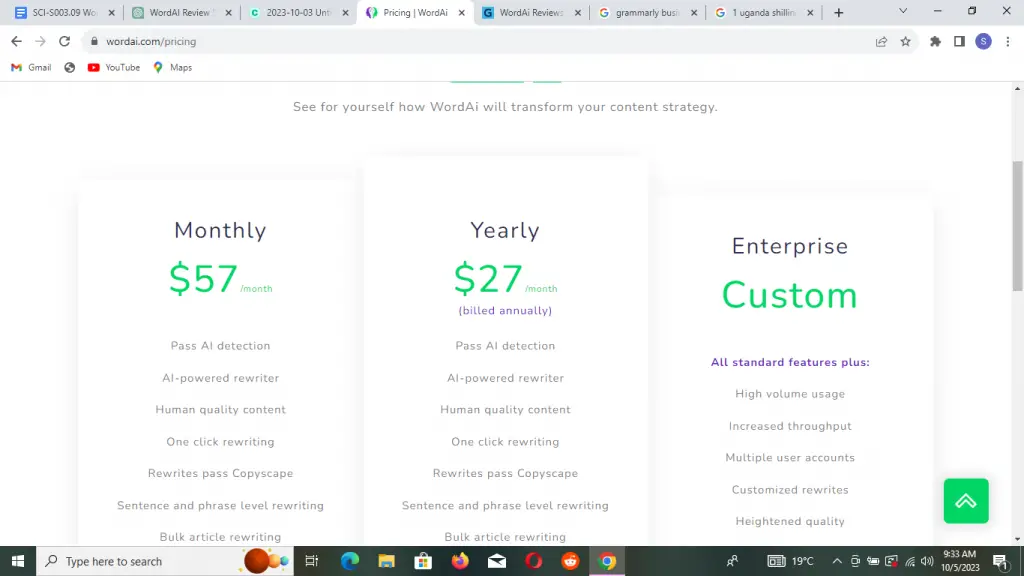
WordAI offers three different pricing plans to cater to varying needs and preferences: Monthly, Yearly, and Enterprise.
Monthly Plan
Price: $57 per month
Features:
- Pass AI detection
- AI-powered rewriter
- Human quality content
- One-click rewriting
- Rewrites that pass Copyscape
- Sentence and phrase level rewriting
- Bulk article rewriting
- API access
- Yearly Plan
Price: $27 per month (billed annually)
Features:
- Pass AI detection
- AI-powered rewriter
- Human quality content
- One-click rewriting
- Rewrites that pass Copyscape
- Sentence and phrase level rewriting
- Bulk article rewriting
- API access
Enterprise Plan
Custom price based on specific requirements
Features:
- All standard features included in the Monthly and Yearly plans
- High volume usage
- Increased throughput
- Multiple user accounts
- Customized rewrites
- Heightened quality
- Dedicated account manager for personalized assistance and support
Customers can choose the plan that aligns best with their needs, whether it’s for individual use or for high-volume enterprise requirements. The flexibility of these plans ensures that WordAI caters to a wide range of users, from individual content creators to businesses with specific and advanced needs.
What do users say in their WordAI reviews and testimonials?
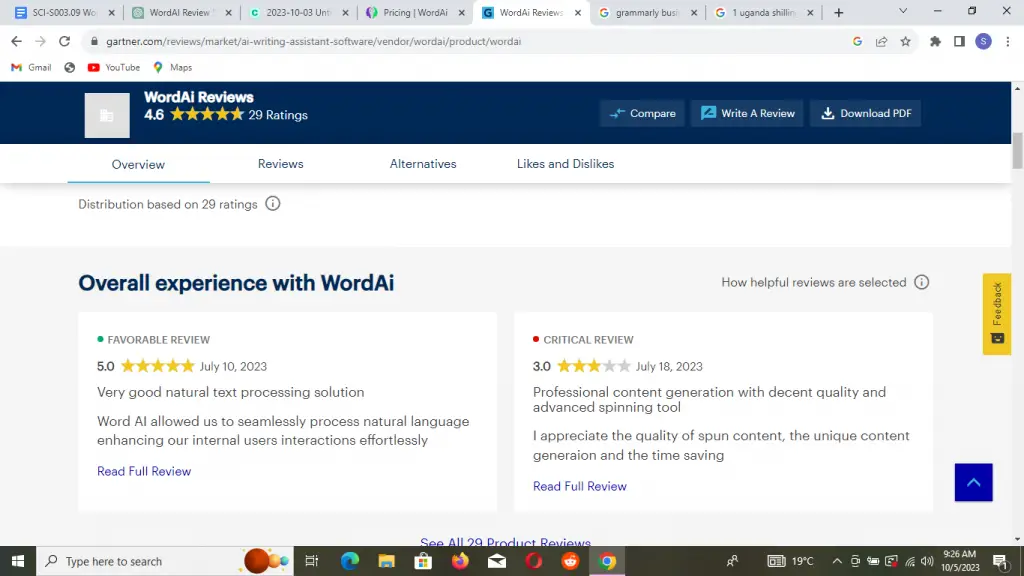
Users rave about Word AI’s exceptional natural text processing solution. It seamlessly processes natural language, enhancing internal user interactions effortlessly.
One user exclaimed, “Very good natural text processing solution! Word AI allowed us to effortlessly process natural language, significantly enhancing our internal users’ interactions.”
In terms of content generation, users praise Word AI for its professionalism and decent quality. The advanced spinning tool is a standout feature, enabling users to generate unique content with finesse. A satisfied user expressed, “Professional content generation with decent quality and advanced spinning tool. I appreciate the quality of spun content, the unique content generation, and the time-saving capabilities.”
These glowing reviews and testimonials highlight the impressive capabilities of Word AI in handling natural language and facilitating content creation, earning it high praise from users.
What are the best WordAI alternatives?
Before we look at the alternatives, here is how WordAI compares to other tools:
| WordAI | Writesonic | Jasper AI | |
| Starting Price (per month) | $57 | $15 | $39 |
| Most notable feature | Generates unique and human-like content | AI image generation | Rewrites content according to your needs |
| No. of Supported Languages | 1 (English) | 24+ | 30+ |
| Integrations | None | Google Docs | Surfer SEO |
| Availability of free trial | Yes | Yes | Yes |
| Customization and personalization | None | None | Yes |
| Limitations | You have less content over the output | Has a learning curve | The rewritten content can lose its original meaning |
When considering alternatives to WordAI for various language-related tasks, several powerful options come to mind. Here are some of the best WordAI alternatives:
#1. Grammarly Business

Grammarly Business is a comprehensive writing assistant tool that not only helps with grammar and spelling but also provides style and tone suggestions. It’s an excellent alternative to WordAI for individuals and businesses looking to enhance their written communication and ensure impeccable language use.
#2. Copy.ai
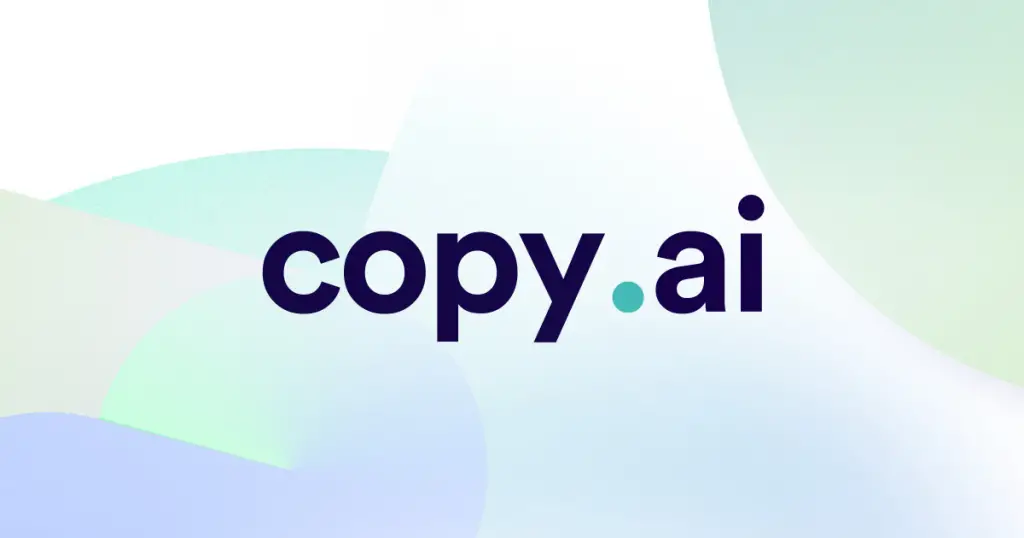
Copy.ai is a versatile AI-powered tool designed specifically for copywriting. It can generate creative and engaging copy for various purposes, making it a strong alternative to WordAI. Whether you need compelling ad copy, social media posts, or other marketing materials, Copy.ai can assist in creating effective content.
#3. Jasper AI
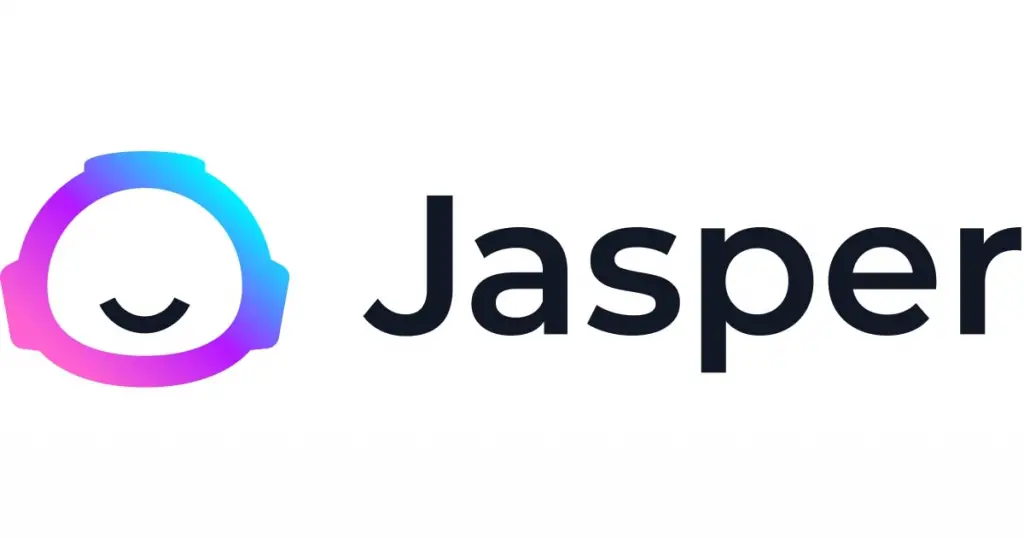
Jasper AI is a powerful tool specializing in content generation. It uses advanced algorithms to generate high-quality written content across different topics and styles. For those seeking an alternative to WordAI that excels in content creation, Jasper AI is a great choice.
#4. Writesonic

Writesonic is another noteworthy alternative to WordAI, providing assistance in content creation and copywriting. It can generate blog posts, marketing copy, emails, and more. With its ability to produce cohesive and coherent content, Writesonic is a valuable tool for anyone looking to streamline their writing processes.
Each of these alternatives offers unique features and strengths, catering to various writing needs. Depending on your specific requirements, you can choose the one that best aligns with your goals and preferences.
My Verdict
WordAI’s Strengths for Academics
Upon careful evaluation of WordAI, it is evident that the tool possesses several strengths that make it highly suitable for academic content creation:
Content Quality and Coherence
WordAI excels in generating coherent and contextually appropriate content, meeting the rigorous standards of academic writing. The generated content is not only well-structured but also reflects a natural flow.
User-Friendly Interface
The intuitive interface of WordAI ensures a seamless user experience. Academics can quickly adapt to the platform, enabling efficient content creation without a steep learning curve.
Ethical Considerations Regarding AI-Generated Content
In assessing WordAI’s suitability for academia, ethical considerations surrounding the use of AI-generated content come to the forefront:
Integrity Issues
Academic institutions prioritize the authenticity and originality of content. The use of AI-generated text raises concerns about maintaining the integrity of scholarly work.
Institutions may have reservations about relying on AI for content creation due to potential challenges in distinguishing between genuinely authored and AI-generated content.
Authenticity and Attribution
Maintaining proper attribution and ensuring that AI-generated content is clearly differentiated from human-authored content is critical for upholding academic honesty and intellectual integrity.
Clarity in attribution is essential to avoid misleading readers and maintain the credibility of the academic discourse.
Overall Verdict
WordAI emerges as a powerful tool for academic content creation, providing a valuable resource for academics seeking to enhance productivity and generate high-quality academic materials. However, addressing the ethical concerns surrounding the use of AI-generated content is essential.
Academic institutions and professionals need to carefully weigh these ethical considerations, setting clear guidelines to preserve academic authenticity and credibility while harnessing the advantages that WordAI provides in content creation.
Frequently Asked Questions
Q1. Is WordAI capable of producing high-quality, readable content?
Yes, WordAI is engineered to produce content that reads naturally and coherently. It focuses on maintaining the original meaning and context of the input while presenting the text in a unique and engaging manner.
Q2. Can WordAI generate content in multiple languages?
Yes, WordAI supports multiple languages and can generate content in various languages, making it a versatile tool for users who need content in different linguistic contexts.
Q3. Is there a limit to the length of text WordAI can handle?
WordAI can handle both short and long pieces of text. However, there may be limitations based on the specific plan or subscription level you have. It’s important to review the plan details to understand any text length restrictions.
Q4. Is the output from WordAI completely original and plagiarism-free?
The output generated by WordAI is unique and distinct from the original input. However, it’s important to note that the uniqueness of the content depends on the quality of the original text and how well WordAI rewrites it. Users should always verify the output for plagiarism using appropriate tools.
Q5. Is there a free trial or demo available for WordAI?
WordAI typically offers a limited-time trial or demo period during which users can explore and test its features. It’s advisable to check the WordAI website or contact their customer support for the most up-to-date information on trial options and demo availability.


